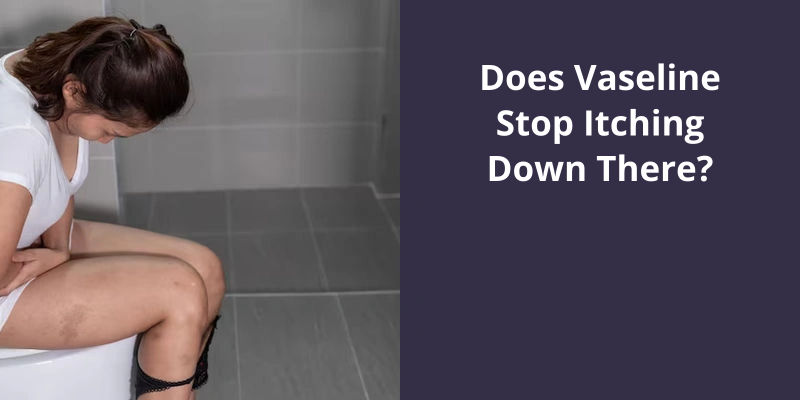Vaseline, also known as petroleum jelly, can help to soothe the skin in the genital area and reduce itching. This is largely because of its moisturizing properties that can soothe dry, itchy skin. Vaseline creates a protective barrier that locks in moisture and speeds up healing in damaged skin. However, it’s worth noting that while Vaseline can relieve dryness or prevent chaffing, it’s not a cure-all for every cause of genital irritation or itching. For instance, it won’t work for yeast infections, bacterial infections, sexually transmitted diseases, or other types of skin conditions. If the itching persists, it is highly recommended to seek professional medical advice as it may indicate a deeper issue.

How Do You Stop Itching and Dry Down There?
Many people may experience itching and dryness in their genital area at some point in their lives. It can be uncomfortable and bothersome, but there are ways to alleviate the symptoms. If the dryness and itching are a result of external factors or lifestyle choices, a healthcare professional may suggest stopping activities like douching or switching medications if possible.
One effective method to soothe dryness and itching is by applying a small amount of Vaseline petroleum jelly. This can create a protective barrier over the dry skin, helping to heal and prevent further irritation. Similarly, coconut oil or even Crisco vegetable shortening can serve the same purpose and provide relief.
It’s important to note that these remedies should only be used externally and not inserted into the vagina. Additionally, it’s always best to consult a healthcare professional for an accurate diagnosis and appropriate treatment plan. They can offer tailored advice based on the underlying cause of the dryness and itching.
Furthermore, practicing good hygiene is crucial in preventing and managing dryness and itching down there. Avoid using harsh soaps or heavily perfumed products, as they can strip the natural moisture from the skin. Opt for gentle, fragrance-free cleansers specifically designed for the genital area instead.
Ultimately, while Vaseline or other moisturizing products may temporarily alleviate itching and dryness, it’s important to address the root cause of the issue for long-term relief. Consulting a healthcare professional is essential to identify any underlying health concerns and receive appropriate treatment.
How to Differentiate Between Normal Genital Itching and a Potential Health Issue
- Normal genital itching is usually temporary and is often caused by dry skin, sweat, or minor irritations.
- If the itching persists or is accompanied by other symptoms such as a rash, discharge, or pain, it may indicate a potential health issue.
- Some potential health issues that can cause genital itching include yeast infections, sexually transmitted infections (STIs), eczema, or allergies.
- It’s important to consult a healthcare professional if you’re unsure about the cause of your genital itching or if it’s causing significant discomfort.
- A healthcare professional can evaluate your symptoms, conduct any necessary tests or examinations, and provide appropriate treatment or advice.
- In the meantime, you can try to alleviate mild itching by keeping the genital area clean and dry, avoiding irritating products or fabrics, and using over-the-counter creams or ointments specifically designed for genital itching.
- Remember, self-diagnosis and self-treatment may not always be accurate or effective, so it’s best to seek medical advice.
Why Is My Female Private Part So Itchy?
Genital itching can be caused by various factors, including infections like yeast infections, bacterial vaginosis, or sexually transmitted infections (STIs) such as herpes or trichomoniasis. These infections can lead to intense itching, along with other symptoms like unusual discharge or a burning sensation during urination.
It’s important to be aware of any changes in your hygiene routine or the products you use and consider if they may be contributing to the itch.
Poor hygiene habits can also lead to itching. Failing to wash the pubic area regularly or not drying it properly can create a moist environment, promoting the growth of bacteria and fungi. This can result in itching and discomfort.
These conditions are often chronic and may require ongoing management and treatment.
Hormonal changes can also play a role in genital itching. Hormonal imbalances, such as those that occur during menopause or pregnancy, can lead to dryness and irritation in the genital area.
If you experience persistent or severe itching, it’s important to seek medical attention to determine the underlying cause and receive appropriate treatment. In the meantime, avoiding irritants, keeping the area clean and dry, and wearing breathable underwear may help alleviate itching. However, it isn’t recommended to use Vaseline or any other petroleum-based products to alleviate itching without consulting a healthcare professional, as these products may not be suitable for the delicate skin in the genital area and can potentially cause further irritation. Always consult with a healthcare professional for personalized advice.
Allergic Reactions and Irritants: Discuss the Possible Allergens and Irritants That Can Cause Itching in the Genital Area, Such as Certain Soaps, Detergents, Fragrances, or Fabrics.
Allergic reactions and irritants can both be potential causes of itching in the genital area. This includes various allergens and irritants, such as certain soaps, detergents, fragrances, or fabrics that come into contact with the skin in that region. These substances can trigger an immune response or cause irritation, leading to itching or discomfort. It’s important to identify and avoid these potential triggers to ease the itching and prevent further irritation.
Yeast infection itch can be quite uncomfortable, but there are ways to alleviate the discomfort. One suggestion is applying thick ointments like Vaseline® or Aquaphor® to create a protective barrier against yeast and reduce itching. Additionally, incorporating probiotics into your routine may also help maintain a healthy balance of yeast levels.
Is Vaseline Good for Yeast Infection Itch?
Many people wonder whether Vaseline can help alleviate itching caused by yeast infections. Yeast infections occur when there’s an overgrowth of the Candida fungus in the vaginal area, leading to symptoms such as itching, redness, and discomfort.
These ointments can help to keep the area moisturized and prevent further irritation. However, it’s important to note that using petroleum-based products like Vaseline may not address the root cause of the yeast infection and could potentially worsen the condition if the ointment traps moisture and promotes fungal growth.
Another potential approach to managing yeast infection itch is considering probiotics. Probiotics contain healthy bacteria that can help keep yeast levels in balance. They’re available in various forms, including capsules, suppositories, and yogurt.
Other Natural Remedies for Yeast Infection Itch, Such as Tea Tree Oil or Coconut Oil
Aside from Vaseline, there are other natural remedies that can help alleviate itching caused by a yeast infection. Two popular options are tea tree oil and coconut oil.
Tea tree oil is known for it’s antimicrobial properties and can be diluted with a carrier oil, such as coconut oil, before applying it to the affected area. It may help reduce itching and inflammation.
Coconut oil is a soothing and moisturizing oil that can also provide relief from itching. Applying a small amount to the itchy area can help soothe the skin.
Keep in mind that while these natural remedies may provide temporary relief, it’s important to consult a healthcare professional for proper diagnosis and treatment of a yeast infection.
Source: Do Home Remedies Actually Work for Yeast Infections?
Using Vaseline as a lubricant during sexual intercourse may potentially increase the risk of yeast infection and vaginal irritation, according to Dr. Yemi Adeyemi, a public health physician and sex educator. It’s important to be cautious with the products we use in sensitive areas to maintain overall vaginal health.
Will Vaseline Irritate a Yeast Infection?
Using Vaseline as a lubricant during sexual intercourse has been a topic of debate among health professionals. While it may provide a short-term solution for lubrication, it’s important to consider the potential risks it poses. According to Dr. Yemi Adeyemi, a public health physician and sex educator, Vaseline can actually increase the risk of yeast infection and vaginal irritation.
Yeast infections are commonly caused by an overgrowth of Candida, a type of fungus that naturally exists in the vagina. The use of petroleum-based products, such as Vaseline, can disrupt the natural balance of bacteria in the vagina, making it easier for yeast to thrive and cause an infection. This can lead to symptoms such as itching, burning, and a thick, white discharge.
It’s thick consistency can also make it difficult to clean off, potentially leaving residue that can contribute to irritation and discomfort.
These lubricants are typically pH-balanced and free from harsh chemicals or irritants, reducing the risk of infections or irritation. Additionally, it’s important to maintain good vaginal hygiene, such as avoiding douching and wearing breathable underwear made of natural fabrics.
If you’re experiencing persistent itching or discomfort in the vaginal area, it’s advisable to consult a healthcare professional. They can accurately diagnose and provide appropriate treatment for any underlying conditions, such as yeast infections, and offer guidance on safe and effective lubrication options for sexual activities.
Tips for Maintaining Vaginal Health: Offer Tips and Recommendations on How to Maintain Good Vaginal Hygiene and Prevent Yeast Infections, Such as Wearing Breathable Underwear, Avoiding Excessive Moisture, and Avoiding the Use of Douches or Harsh Soaps.
- Wear breathable underwear
- Avoid excessive moisture
- Avoid using douches or harsh soaps
- Maintain proper hygiene
- Practice safe sex
- Avoid tight-fitting clothing
- Eat a balanced diet
- Stay hydrated
- Avoid prolonged sitting in wet swimwear
- Use unscented products
- Avoid using scented toilet paper
- Change sanitary pads or tampons regularly
- Wipe from front to back after using the toilet
- Avoid unnecessary use of antibiotics
- Regularly change and wash bedding
Itching around the vulva and vagina can be quite uncomfortable, leading many people to wonder about it’s possible causes. The itchiness can stem from various factors, including contact with irritants like fabrics or scented soaps, allergies, infections such as yeast infections and bacterial vaginosis, as well as certain skin conditions.
What Does It Mean if It’s Really Itchy Down There?
Experiencing intense or persistent itching around the vulva and vagina can be quite concerning. Although it may vary from person to person, there are several potential causes for this uncomfortable sensation. One common reason could be irritation caused by contact with fabrics, such as synthetic materials or tight clothing. Moreover, scented soaps or detergents may also irritate sensitive skin in the area, leading to itchiness.
Another possible cause for itching is allergies. Some individuals may be allergic to certain hygiene products, including tampons, pads, or even condoms. It’s important to pay attention to any potential triggers and consider switching to hypoallergenic or fragrance-free alternatives to alleviate the discomfort.
Yeast infections are a prevalent culprit for vaginal itching. These infections occur when there’s an overgrowth of yeast in the vaginal area. Some symptoms that accompany yeast infections include white discharge, redness, and swelling. It’s worth noting that itchiness due to yeast infections tends to be more severe at night.
Although it may not always cause symptoms, bacterial vaginosis can result in a fishy odor, greyish discharge, and irritation around the vulva. Treating bacterial vaginosis usually involves antibiotics prescribed by a healthcare professional.
For instance, conditions like lichen sclerosus or lichen planus can cause persistent itchiness, accompanied by changes in the skins appearance. If you suspect a skin condition may be the cause, it’s crucial to consult with a healthcare provider who can provide an accurate diagnosis and recommend appropriate treatment options.
To find relief from vaginal itching, it’s advisable to avoid harsh chemicals, keep the area clean and dry, and wear breathable underwear made from natural fibers. Additionally, maintaining good hygiene practices, such as wiping from front to back after using the toilet, can help prevent further irritation. If the itching persists or becomes severe, seeking medical advice is always recommended to address any underlying causes and ensure proper treatment.
Common Causes of Vaginal Dryness and Itchiness
Common causes of vaginal dryness and itchiness can include hormonal changes, such as those that occur during menopause or pregnancy. Other factors that can contribute to these symptoms include certain medications, such as antihistamines or antidepressants, and certain health conditions, such as yeast infections or sexually transmitted infections.
Excessive washing or using harsh soaps in the genital area can also cause dryness and irritation. Allergies to certain products, such as latex or feminine hygiene sprays, can further aggravate the symptoms.
If you’re experiencing vaginal dryness and itchiness, it’s important to see a healthcare provider for a proper diagnosis and treatment. They may recommend using a water-based lubricant or moisturizer to alleviate dryness, avoiding irritants, practicing good hygiene, and treating any underlying infections or conditions.
While Vaseline can provide temporary relief from dryness, it isn’t specifically designed for use in the vaginal area and may not effectively address the underlying cause of the itching. Therefore, it’s best to consult with a healthcare professional to determine the most appropriate treatment for your specific situation.
Conclusion
In conclusion, when it comes to itching down there, Vaseline can indeed provide relief. Whether it’s dryness caused by external factors or lifestyle choices, Vaseline can be used as a soothing agent. They may suggest avoiding douching, changing medications if possible, or even trying alternative remedies such as coconut oil or Crisco vegetable shortening. Remember, taking care of your intimate health should always be a priority, and seeking medical advice is the best course of action when faced with persistent discomfort.





